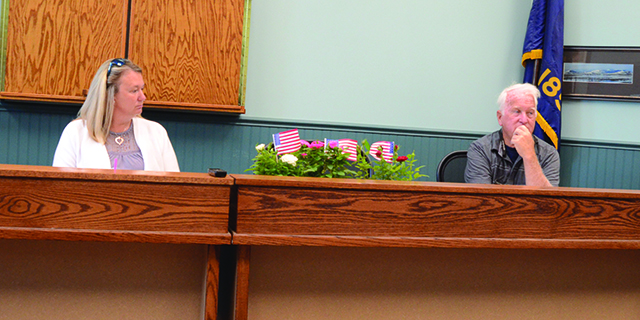A thank you to Sen. Edwards on wolf bill
Published 10:45 am Tuesday, March 8, 2016

- Oregon State Sen. Bill Hansell
The Oregon Legislature has adjourned for the 2016 short session, and the night before we bid Salem goodbye we passed HB 4040A, otherwise referred to as the wolf bill.
Rep. Greg Barreto and I were the chief sponsors, and the intent of the bill was to affirm the Oregon Fish and Wildlife Commission’s November decision to remove the gray wolf from Oregon’s endangered species list. Several environmental groups filed a lawsuit against the decision.
Trending
Under the leadership of Rep. Barreto, HB 4040A moved through the Oregon House with bipartisan support and passed on to the Senate. Thanks to Sen. Chris Edwards (D-Eugene), the chair of the Senate Environment and Natural Resource committee, the bill made it to the floor of the Senate.
Sen. Edwards — in what I believe to be a very courageous political speech — spoke to the aspects of the bill. I asked him if I could share his speech with readers from my part of the state, and he gave me his permission. Sen. Ted Ferrioli, the Senate Republican leader, told me he believed this bill was the most important piece of legislation for rural Oregon to come out of this session. I am deeply indebted to Sen. Edwards for his leadership and support for HB 4040A.
What follows is his Senate floor speech:
HB 4040A affirms that the decision made by the Oregon Fish and Wildlife Commission (a commission that is appointed by the Governor and confirmed by the Senate) met the requirements set out in Oregon law with respect to their decision to “delist” the gray wolf in Oregon.
Months before this Legislative session, I began investigating the issues surrounding the Commission’s then-pending decision to remove wolves from the State’s Endangered Species List.
After multiple conversations with the governor’s Natural Resource Policy Advisors, (one of whom helped negotiate the Wolf Conservation and Management Plan on the side of wolf conservation advocates in 2005) and ODFW staff, it became clear to me that while wolf recovery advocates have claimed their concerns are about science, the real purpose of filing a lawsuit challenging the commission’s delisting decision is to gain leverage in the process of Wolf Plan review and revision. In fact, this intent has been clearly expressed in emails to at least one of the governor’s natural resource policy advisors.
Trending
I have already explained what HB 4040A will do. Here is what it will not do.
• The bill does not change the Wolf Conservation and Management Plan in the state of Oregon; a plan that we should be celebrating, as it has been a huge success, leading to faster recovery of wolf populations than ever anticipated.
• The bill does not endanger wolf recovery in any portion of their territory.
• The bill does not prevent the commission from relisting or taking any number of other measures to assist wolf re-establishment should wolf numbers unexpectedly decline.
The effect of the bill could be to somewhat (though not entirely) moot certain claims about the commission’s decision that are likely to be litigated. The science is pretty clear, and the scientific basis of the commission’s decision (as recommended by Oregon’s wolf biologists and peer reviewed by internationally renowned wolf biologists), is on very firm ground. Even the Wildlife Society, a professional and scientific society of wildlife biologists, during their testimony against the bill for procedural reasons acknowledged that ODFW biologists got the science right.
Wolf re-establishment in Oregon has been a highly contentious issue, and in my opinion a conference room, not a courtroom, is the best place to settle disagreements over the contents of the Wolf Plan.
At stake are trust and goodwill on the part of stakeholders as changes to the Wolf Plan are contemplated. Some conservation groups (not all) believe that a lawsuit over the commission decision is a good way to leverage settlement discussions that would result in changes they would like to make to the Wolf Plan; a plan that was difficult and contentious to negotiate and included more parties than just those that are suing the commission.
We have a Fish and Wildlife commission that is appointed by the governor and confirmed by the Senate to manage wildlife issues in this state, taking into account input from all corners of Oregon. I don’t believe that the process of using a lawsuit to gain leverage on this contentious issue will be good for our state, as it destroys trust between parties during the Wolf Plan review and revision process.
This issue has taken on greater significance as it comes during a time when Eastern Oregon folks are feeling particularly ignored as Western Oregon constituencies push policies that they feel are out of touch with the realities of their lives on the far side of the state. I mostly (though not entirely) disagree with that sentiment. Nonetheless, some healing is needed.
Environmental lawsuits are sure to deepen the divide and mistrust and will make future Wolf Plan revisions more difficult and more contentious. At some point, we have to stop this cycle.
Those of us who support wolf recovery (and I am one of them) should accept that we have won and wolves are in strong recovery. Should that recovery ever falter and trend in the other direction, we need to be ready to act if the commission does not. But that doesn’t appear to be a risk any time in the near future.
What is at risk are working relationships established between wolf recovery advocates (for whom the Wolf Plan isn’t protective enough) and ranchers (who never wanted wolf recovery in the first place).
Ranchers have come to accept that the reality of living with wolves on the landscape is here, and as such, have become supportive of management efforts of the recovery. And given the continued success of wolf recovery efforts, conservationists should accept this win, and continue to work through the public process with all interested parties at the table to negotiate changes to the Wolf Plan that they would like to see, without resorting to the leverage of lawsuits.
Since being granted the honor to chair the Senate Committee on the Environment and Natural Resources, I have committed to always call them like I see them, and take on issues, no matter how controversial, that improve the health of our communities, the health of our environment, the health of our natural resource dependent economies, and balance fairness in process.
Clearly, there is often conflict between what is healthy for ecosystems and what is healthy for natural resource dependent economies; and what one person sees as fair, another may see as burdensome. That conflict is sometimes unavoidable. So while seeking to balance competing values, it is imperative that we at least honor fairness in process; a process that has led to a carefully negotiated Wolf Recovery and Conservation Plan.
HB 4040A seeks to maintain balance and fairness as the commission begins the difficult work of review and revision of the Wolf Plan, a plan of which we should be proud, as it has been successful in re-establishing wolves in the state of Oregon.
State Sen. Bill Hansell (R-Athena) represents District 29, which includes Wallowa, Union, Umatilla, Morrow, Gilliam, Sherman counties and half of Wasco County. Sen. Chris Edwards is a Democrat from Eugene.








